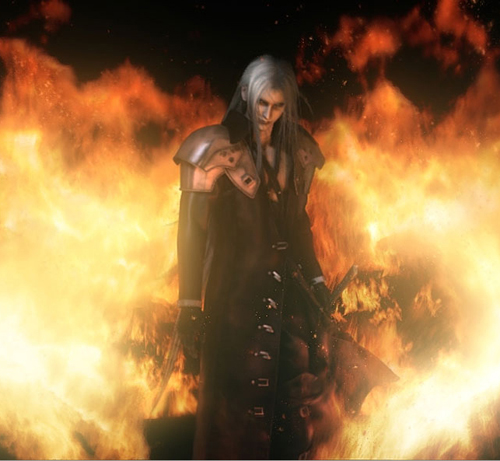
In direct contrast to yesterday’s Final Fantasy villain, some characters are just made to be the ultimate evil. If handled poorly, this can come across as painfully cliche and uninteresting, because such evil often eschews any sort of humanity, and if an audience is to connect to a character, there must be some aspect of humanity within them, even (especially in the case of villains) if that humanity is dark and twisted. We can fear a creature that is simply walking death, but without some sense that there’s a person in there, we can’t truly dislike them for what they are. A character who walks this line rather impressively is Sephiroth, the master villain of Final Fantasy 7.
Despite fitting it rather well, Sephiroth also falls outside the classic mold of the arch-villain in some ways. Rather than an evil emperor, wizard, general, or god, he’s a swordsman, a role usually held by heroes. His design, rather than being ornate, is simply silver hair and a black cloak with a long katana. Indeed, it is easy to imagine him as the overly cool protagonist of another story. While most villains on his level sit at the head of massive armies and have henchmen to carry out their will, Sephiroth mostly does his own dirty work, with only a few allies and fanatics who willingly throw themselves at his enemies. Instead of some villainous calling card in the form of a verbal tic or a grand entrance, Sephiroth comes and goes with little fanfare, the only sign that he’s been somewhere being the massive pile of dead bodies left in his wake. Indeed, it was impossible to know just when and where he was going to show up, and on more than one occasion, Sephiroth successfully ambushed the heroes, but more on that in a bit.
Sephiroth was originally the greatest hero of Soldier, a group of elite, genetically engineered warriors who served the unscrupulous Shinra Corporation. While he was somewhat distant and cocky, he was sane, and fought heroically for his comrades and employers. It was only when he began to understand the dark secret of his origins that everything changed. Upon learning that he was the genetic child of Jenova, an alien creature with incredible power, he quickly developed a god complex and a belief that humans, as well as the entire world itself, were insignificant. He became fanatically devoted to his “mother,” and while reclaiming her remains, he burned an entire city to the ground. From there he disappeared, and set about claiming his destiny as a living god.
I have always found fanaticism to be an interesting mindset. For the most part, it implies that a person is sane in every regard except for some belief or beliefs they have. This can lead them to carry out actions which are terribly evil or irrational in an extremely methodical and logical fashion. Sephiroth is certainly such a fanatic, with his belief in his mother, and thus himself, as gods guiding him to commit endless atrocities with virtually no emotion. There are some who make fun of Sephiroth, citing what they call his “mommy issues,” and while that case could be made, I think his obsession, which is more religious than oedipal, is part of what makes his character interesting. From Jenova’s remains, Sephiroth spawns several powerful monsters, but Jenova herself is dead, and devoid of any personality. This suggests that Sephiroth’s motivations are in fact his own, and his desire to be a god comes not from outside influence, but within his own psyche, and Jenova is simply what he uses to justify his behavior.
Another major factor in Sephiroth’s popularity is that of all the Final Fantasy villains, he committed the most heinous of crimes: the murder of Aeris Gainsborough. While heroes had died in previous Final Fantasy games, most of them were older characters, semi-reformed villains, or those who willingly gave their lives so the rest of the team could escape. Aeris, however, was a young, innocent girl who sold flowers, and who desired not to fight, but to save the world through nonviolence, nearly doing so before she was killed. She was also the love interest of hero Cloud Strife (sort of, it’s complicated). It’s bad enough that when Cloud comes upon Aeris for the last time, Sephiroth attempts to make him kill her through mind control (and nothing the player does keeps him from trying to do so), but then, just when it seems the crisis is averted, Sephiroth descends from the sky like a silent owl and impales her on his sword. He gives Cloud a brief smirk, taunts him, and escapes while the hero grieves. Besides being a huge shock, it is one of the most iconic and traumatic moments for fans of the game, and quickly cemented Sephiroth as an irredeemable monster who deserved nothing but death.
Sephiroth manages to be the best of all worlds as a Final Fantasy boss. He is cool, scary, and unstoppable, but also oddly vulnerable and tragic. His grand scheme is one of world destruction and ascension to godhood, but his murder of Aeris makes us want to kill him for personal reasons. His popularity is understandable, but it is important to remember that he is the villain, and should in no way be sympathized with. That he manages to be all these things at once without contradicting himself or lapsing into inhuman and incomprehensible evilness is what makes Sephiroth a villain among villains.
